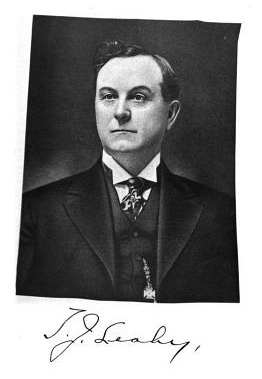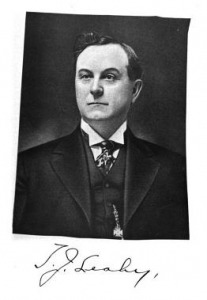Timothy Leahy was a brother of M. D. (Maurice) Leahy who founded and was president of the Freethought University at Liberal, Missouri. The University was founded when Leahy was but about 21 years of age and lasted for two years, dissolving due to some falling out with George Walser, and subsequently being unable to maintain a presence due to financial hardship. I post the following biography on Timothy Leahy, published in the Standard History of Oklahoma in 1916, as it will reveal a little more of something of Leahy’s family in addition to what Timothy had written to the Freethought publication Blade of Grass, on his then deceased brother, in September of 1909.
* * * *
Hon. T. J. Leahy is widely known as a man of high attainments, of profound erudition and practical ability as a lawyer, and as one who has achieved success in his profession. He is one of the most interesting of the prominent characters whose worth and merit have graced the history of Oklahoma as a state and territory, and was one of the two members elected to the Constitutional Convention from the Fifty-sixth District. In that high position he performed particularly notable work as a member of the Committee on Public Service Corporations, as such, making a thorough study and unprejudiced investigation of the great problems in connection with the governmental regulation of public service corporations, giving his best thought and judgment in an effort to arrive at a just solution of this modern and somewhat complex phase of legislation. The constitutional provisions result of this committee’s work in the convention are conceded to be of the greatest beneficence to the state.
Mr. Leahy is one of the strong leaders of the bar in Oklahoma. For several years he conducted a large criminal practice, which is still a feature of his legal business, having an established reputation for success in, that line. His practice as a whole, however, is of a general nature, extending into several states in addition to the Oklahoma State and Federal courts and the Interior Department. He was chairman of the commission that investigated the status and value of the segregated coal and other mineral lands of the Indian Territory and made recommendations as to the advisability of having the state purchase those lands. He spent much time and labor on the work of this commission, the report of which was submitted to the governor of Oklahoma in 1908. Mr. Leahy was also father of the measure, which was made a part of the Bill of Rights, providing that the right of the state to enter into public enterprise for public purposes should uot be denied. The labor unions and laboring element generally were particularly pleased with Mr. Leahy’s championship of measures in their interest in the Constitutional Convention. He is democratic in politics.
Mr. Leahy is a member of a family well known in the Osage Nation for many years back, and his cousin, W. T. Leahy, and uncle, Thomas Leahy, stockmen and bankers and residents of Pawhuska, have been prominently identified with various interests in this country since the early eighties. But the Hon. T. J. Leahy is a native son of Kansas, born in Neosho County, in 1868, his parents born natives of Ireland, being early settlers in that state. His father died in 1869, but his mother is still living. Her home is in Pawhuska., Mr. Leahy was reared in Neosho County, Kansas, receiving a common school and normal education. He studied law in both Kansas and Oklahoma and was admitted to the bar in 1892. In that year he settled permanently in Pawhuska, the capital of the Osage Nation, although he had been in the Nation back and forth since 1884. He belongs to the Masonic Order, and also the Knights of Pythias, of which latter he is past grand chancellor of Oklahoma.
Mr. Leahy married in Pawhuska, Miss Bertha Rogers, who was born and reared there, a member of an old family of part Osage Indian blood, and daughter of Hon. Thomas L. Rogers, whose sketch is found in another page of this volume. Mr. and Mrs. Leahy have four children: Thomas Rogers, Cora Willella, Mabel Ann and Edward Arthur.


Leave a Reply